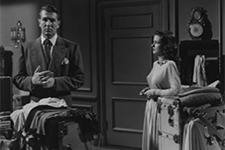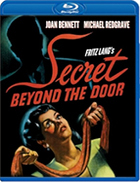Secret Beyond the Door
|  Fritz Lang’s Secret Beyond the Door was made during a particularly prolific period in the German émigré’s second life as a Hollywood director. He had recently completed a series of anti-Nazi films—Man Hunt (1941), Hangmen Also Die! (1943), Ministry of Fear (1944), and Cloak and Dagger (1946)—and Secret marked a return to the realms of psychological fantasy and criminal intrigue that had defined so many of his silent-era and early sound German films. Unfortunately, the film also marked the end of an important collaboration, as conflicts during production and the film’s critical and commercial failure brought fully derailed the short-lived Diana Productions, a semi-independent company Lang had founded with star Joan Bennett and her husband, producer Walter Wanger. Lasting a scant three years (1945–1948), the company only produced two films—this one and Scarlet Street (1945), which also starred Joan Bennett in one of her five collaborations with Lang (Secret would be their last, which is unfortunate given that Bennett, by her own admission, gave her best performance under Lang’s direction). The story, which was loosely derived from the novel Museum Piece No. 13 by the prolific, but now largely forgotten crime and mystery writer Rufus King, is assembled from a lot of familiar bits and pieces. A kind of modern Gothic romance in the same mold as Alfred Hitchcock’s Rebecca (1940) and a twisted exemplar of what critic Mary Ann Doane called “the paranoid woman’s film,” Secret Beyond the Door plays on the long-standing trope of a woman whose life is threatened (or may be threatened) by her husband (the very persistence of this trope has a lot to say about gendered violence in Western culture). The woman in this case is Celia Cavanagh (Joan Bennett), who is wealthy and indepdendent and resists the draw of typical men, including a well-meaning lawyer (James Seay) who settles the estate of her late older brother, Paul (Rick Barrett). While on vacation in Mexico with her friend Edith (Natalie Schafer), Celia meets Mark Lamphere (Michael Redgrave), a man just enough out of the ordinary to draw her attention and fuel her desire (which is tangled up with her arousal at watching a knife fight). Their romance is head-spinning in its speed, and soon she is standing at the altar, but in a moment of prescient concern, she worries about marrying a man she knows very little about. Nevertheless, she goes through with it, and soon finds herself at Mark’s familial estate in upstate New York, where she is at the mercy of Mark’s dominant older sister Caroline (Anne Revere)—a barely disguised lesbian in the ???? mold—and Mark’s secretary, Miss Robey (Barbara O’Neil), who hides half of her face, which was disfigured in a fire. Celia must also contend with David (Mark Dennis), Mark’s preternaturally mature adolescent son whose existence she was completely unaware of until she arrived at the house. As it turns out, a son from a previous marriage is just the tip of the proverbial iceberg of information that Mark has kept from Celia, and the film hinges on whether or not she will persist in trying to maintain their relationship despite an increasingly obvious set of obstacles that take on a dark, Freudian tone, especially when Mark, an architect by trade who theorizes about the effect of spaces on the behaviors that transpire within them, reveals at a party that part of his family mansion is taken up with rooms he has purchased and rebuilt over the years within which gruesome murders took place (the title refers to a seventh room that is hidden behind a locked door that Mark refuses to discuss). The physicality of these rooms’ presence within the domestic space attests to his obsession and how it goes far behind intellectual curiosity in the morbid and murderous; and, if that weren’t enough, there is a convenient psychology student (Anabel Shaw, credited as “Intellectual Sub-Deb”) on hand to explain Freudian concepts such as the unconscious and the Oedipal Complex. Like Jacques Tourneur’s Cat People (1942), Secret Beyond the Door proudly wears its psychoanalytic bona fides on its sleeve, and whether or not the climax and conclusion work for you is largely dependent on your buy-in. Truth be told, the script for Secret Beyond the Door, which was penned by Silvia Richards (who later co-wrote Lang’s 1952 Western Rancho Notorious), is pretty silly and flimsy, although it offers enough intrigue to keep you engaged even as you might find yourself rolling your eyes from time to time (let’s just say that Bennett’s willingness to keep trying to stay with Redgrave strains credulity at times, even by 1940s standards of victimized women standing by their neurotic, emotionally abusive men). Where the film really soars is in the visuals. Lang, working with cinematographer Stanley Cortez (The Magnificent Ambersons, Night of the Hunter), pushes the story to the edges of the surreal, with intense lighting effects (note how many times Redgrave’s face falls into ominous shadow), fluid tracking shots, and dreamlike imagery beginning with a literal dream sequence created by none other than the animators at Walt Disney’s studio). At times the film descends (in the best sense of the word) into the realm of Gothic horror, with swirling mist and fantasy-like forests swallowing character and motivation in great gulps of visual grandeur. That otherworldly sense is intensified by Bennett’s breathy narration, which at the time was seen as a departure from convention. Now, I couldn’t imagine the film without it, as it brings us into her psychological interior and reinforces the fundamentally emotion nature of her character’s connection to Redgrave’s. It doesn’t really make sense narratively or logically, but it feels just right.
Copyright © 2024 James Kendrick Thoughts? E-mail James Kendrick All images copyright © Kino Lorber | |||||||||||||||||||||||||||||
Overall Rating: 

 (3)
(3)


